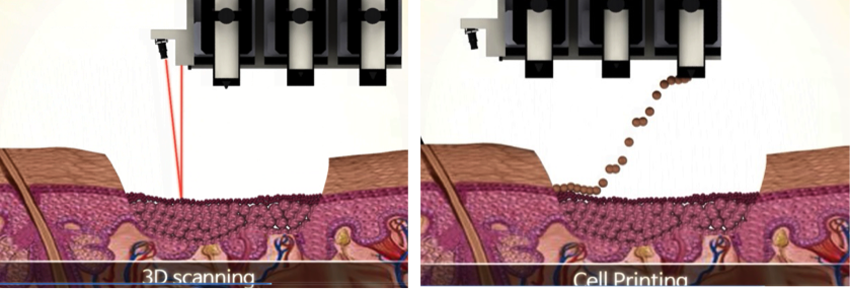3D printer manufacturer Rokit has been a constant innovator in the South Korean 3D printing market, but most of their printers up until now have been more traditional and consumer-grade systems. But after getting a nice boost in the form of a $3 million grant from their government last year, it was revealed that they had begun working to
develop an in-situ bioprinting system for skin regeneration. That research has just been actualized with the release of the Edison Invivo, Rokit’s new tissue engineering and bio-medical research 3D printer. And though this technology has certainly been explored in the biomedical field for a while now, it’s extremely rare to see a more traditional 3D printer manufacturer such as Rokit take a crack at commercial bioprinting.
The Edison Invivo uses a bio ink to produce cell structures in the form of organic tissue, with the goal of making it possible to create personalized and transplantable tissue from the cells collected from a specific patient. There are also a handful of other biomaterials that are compatible with the Edison Invivo, including PLGA, PCL, PLLA, collagen, Alginate, Silk fibroin, and others. Rokit hopes to have the Invivo ‘change the landscape’ of the bioprinting field, offering a wide range of material that are widely used in tissue engineering research. Rokit’s Edison Invivo is engineered specifically for tissue engineering research, which makes their bioprinter more affordable and mechanically efficient than many other 3D bioprinters.
“Compared to the increase in demand for 3D printing three-dimensional tissue engineering research, price of existing products is too expensive,” a Rokit company official explained. “In many cases 3D bio printers focus on simple mechanical efficiency rather than specifications that researchers want.”
Obviously constructing a 3D bioprinter is a challenge for any 3D printer manufacturer, but Rokit CEO Yoo Seok-hwan was able to use his experience as the former CEO of Cellitron Healthcare, a global healthcare company that specializes in the production of biosimilar antibody therapeutics and new biopharmaceuticals. “Based on the experience as former CEO of Celltrion Healthcare, we developed Edison Invivo by merging the Bio and 3D print technology,” Seok-hwan said. “I hope this product contributes to pioneered new areas in Korea’s bio-industry.” So far, it seems that their work in bioprinting will indeed be a pioneering force in South Korea’s biomedical field.
Rokit has already carried out a government project in collaboration with the Korea Institute of Machinery & Materials, the Seoul National University Hospital, Korea Advanced Institute of Science and Technology, and Hanyang University to bioprint artificial skin for implant. They plan to commercialize another bioprinter soon that is capable of printing this patient-specific skin. It’s not everyday you see a traditional 3D printing company release a 3D bioprinter, but with Yoo Seok-hwan’s biomedical experience and overwhelming support from the South Koren government, Rokit has a better chance than anyone to succeed.




